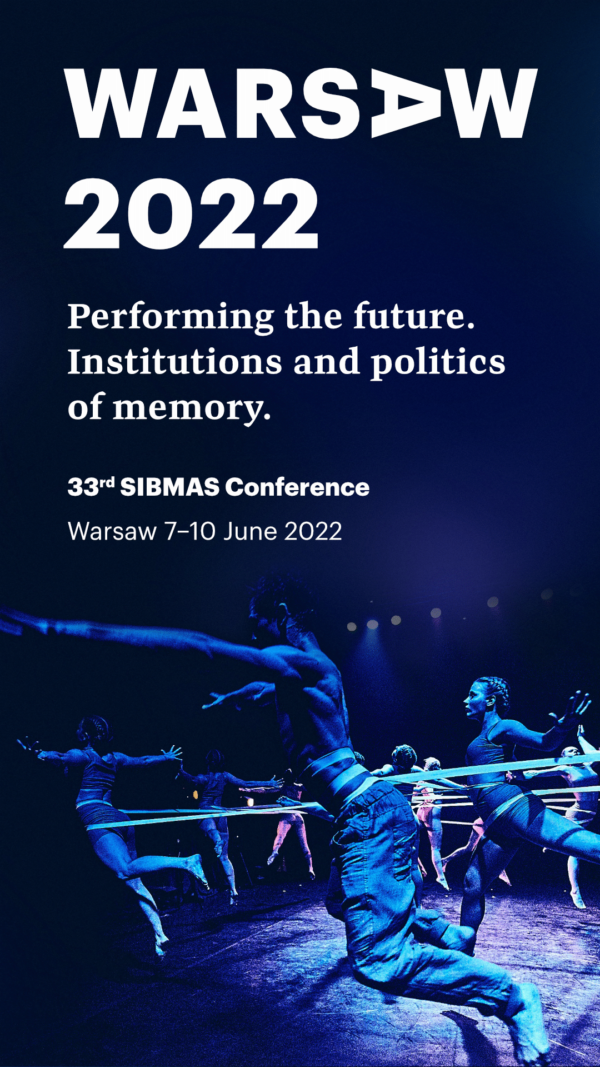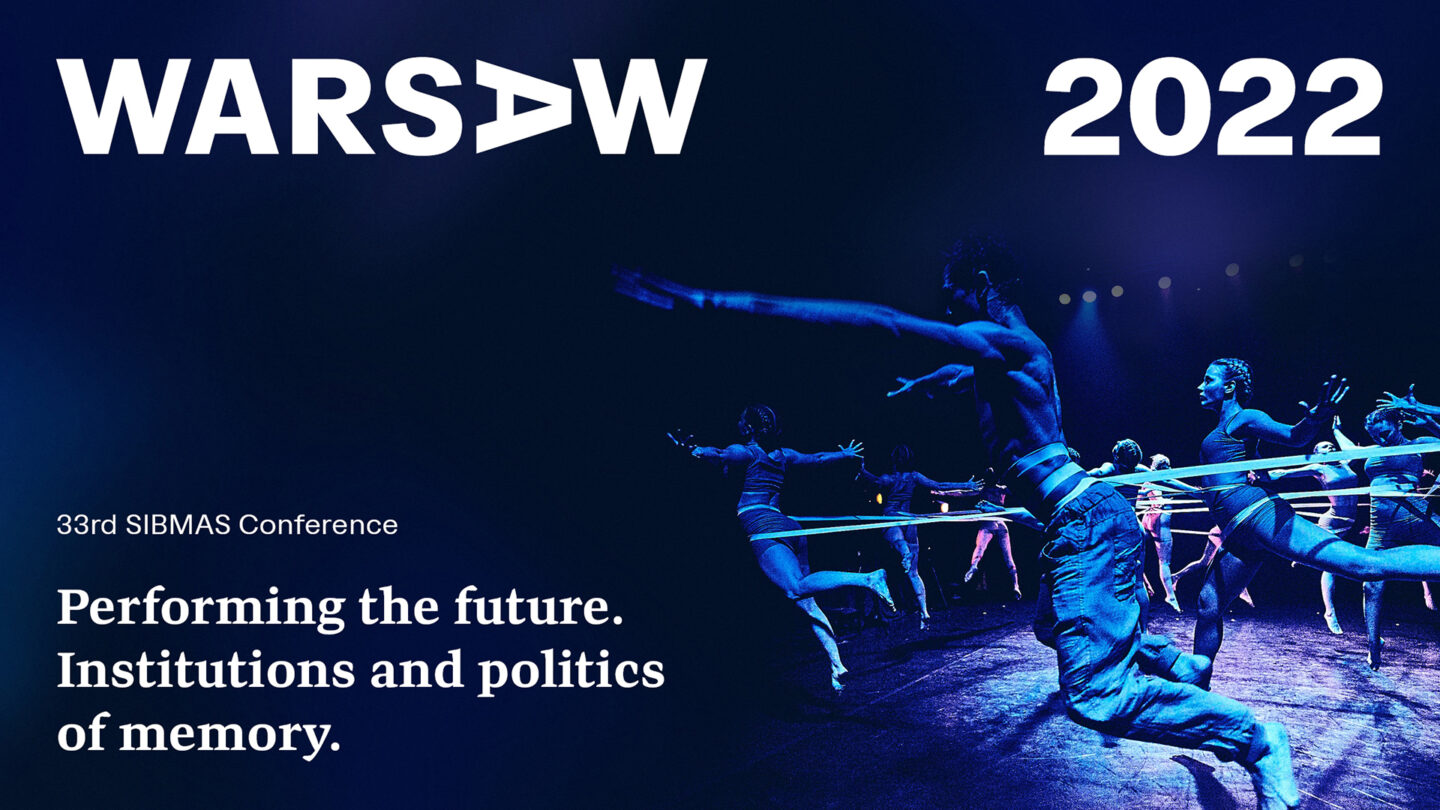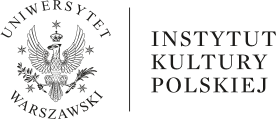[ENG]
The Organisational Committee of SIBMAS and The Zbigniew Raszewski Theatre Institute invite to 33rd SIBMAS Conference – „Performing the future. Institutions and politics of memory” – which will take place from 7 to 10 June.
Being a user of a library, an archive or a museum always means – whether we want it to or not – entering a political arena. The institutions which gather, organize and disseminate information about the past are powerful participants in building a cultural self-image. Of course, this situation also applies to institutions dealing with theatre and performing arts and its heritage.
Many accepted cultural rules reflect a certain hierarchy and system of innate values. Some cultural texts, genres, images, artworks and voices are privileged while others are marginalised or simply disappear from the field. Within this dynamic institutions are not solely passive puppets. They can actively participate in shaping the rules by which they operate and they can open the dialogue for discussion, commentary and negotiation on how and what we collect and exhibit. The way institutions manage and narrate history directly influences the future that they themselves help to design. Narratives, images and artworks from the past and present shape the cultural vocabulary and the sensibility of their recipients. An image of the world and its values comes from the choices, we make in documenting history.
Today, when we are experiencing the destabilisation of the foundations of democratic governance and are at risk of creating global crises, we must focus on the political dimension present in our institutions. Organizations that are responsible for retelling the past must appraise their resources and take responsibility for the choices they make. This has become an urgent and vital issue for us all as professionals tasked with saving the intangible heritage of the global story of performing arts and raises the question of how we can collaborate to safeguard open societies and work to develop a pluralistic vision of culture that includes voices of the excluded.
The 33rd SIBMAS Conference will focus on the following issues:
- Facts, emotions, narratives – ideas and practices of a narrative museum.
- Museums, archives and libraries as an interactive space – how to develop a relationship with visitors, practitioners of performing arts, and collectively contribute to an open society.
- Marketing and collection – developing exhibitions and an image for a library or collection.
- Theatre heritage institutions and the politics of memory – what narratives do we need and for what purpose?
- Canonical and alternative approaches to the archives and library collections on performing arts.
- Body and archive – documenting of “unpreservable” by museums, archives, libraries or artists themselves.
- Performing the past/reviving the narrative – collaboration between archives, museums, libraries on the one hand and artists on the other.
- The impact of policies, politics, and conventions on theatre and performing arts practices as well as its preservation.
- Ecology in the library, archive and museum – practicing care for the Earth; how do perform jobs and help save the planet
We invite to the broadcast of conference which will be available on Institute’s website, YouTube channel and fanpage on Facebook. You can also take part in event as auditor (free entry) – due to limited numbers of seats please contact with coordination.sibmas@instytut-teatralny.pl before.
[PL]
Komitet Organizacyjny SIBMAS (Międzynarodowe Stowarzyszenie Bibliotek, Muzeów, Archiwów i Ośrodków Dokumentacji Sztuk Performatywnych) oraz Instytut Teatralny im. Zbigniewa Raszewskiego zapraszają w dniach 7-10 czerwca na 33. Kongres SIBMAS – „Performing the future. Institutions and politics of memory”.
Bycie użytkownikiem biblioteki, archiwum czy muzeum zawsze oznacza – czy tego chcemy, czy nie – wejście na arenę polityczną. Instytucje, które gromadzą, organizują i rozprzestrzeniają informacje o przeszłości są znaczącymi uczestnikami w budowaniu kulturowego wizerunku. Ta sytuacja dotyczy także instytucji zajmujących się teatrem, sztukami performatywnymi i ich dziedzictwem.
Wiele przyjętych reguł kulturowych odzwierciedla pewną hierarchię i system wartości. Niektóre teksty kultury, gatunki, obrazy, dzieła sztuki są uprzywilejowane, podczas gdy inne marginalizujemy lub po prostu pomijamy. W tej dynamicznej sytuacji instytucje nie są jedynie biernymi obserwatorami. Instytucje powinny brać aktywny udział w określaniu reguł oraz umożliwiać dyskusję dotyczącą tego, co i jak należy gromadzić oraz eksponować. Sposób w jaki instytucje zarządzają i opowiadają o historii bezpośrednio wpływa na projektowanie przyszłości. Relacje, obrazy i dzieła sztuki z przeszłości kształtują słownictwo kulturowe i wrażliwość ich odbiorców. Obraz świata i jego wartości wynika z wyborów, jakich dokonujemy poprzez dokumentowanie historii.
Dziś, gdy wszyscy doświadczamy destabilizacji fundamentów demokratycznych rządów i ryzyka pogłębiania się globalnych kryzysów, organizacje odpowiedzialne za opowiadanie historii muszą ocenić swoje zasoby i wziąć odpowiedzialność za podejmowane decyzje. Właśnie to stało się pilną kwestią dla wszystkich tych, których zadaniem jest ocalenie niematerialnego dziedzictwa historii sztuk performatywnych. Rodzi się pytanie, w jaki sposób powinniśmy współpracować, aby chronić społeczeństwa otwarte i wspólnie rozwijać pluralistyczną wizję kultury, obejmującą głosy wykluczonych.
Tematy 33. Kongresu SIBMAS „Performing the future. Institutions and politics of memory”
- Fakty, afekty, narracje – idee i praktyki muzeum narracyjnego
- Muzea, archiwa i biblioteki jako przestrzenie interaktywne – jak rozwijać relacje z użytkownikami i praktykami sztuk performatywnych, by wspólnie budować otwarte społeczeństwo
- Komunikacja i kolekcja – tworzenie wystaw i narracji wokół instytucji
- Instytucje zajmujące się dziedzictwem teatralnym a polityki pamięci – jakich narracji potrzebujemy i do czego
- Kanoniczne i alternatywne rozumienie archiwum sztuk performatywnych
- Ciało i archiwum – dokumentacja tego, co niemożliwe do zachowania
- Performowanie przeszłość/przetwarzanie narracji – współpraca między instytucjami i artystami
- Wpływ założeń ideologicznych oraz polityk kulturalnych na teatr i instytucje zajmujące się jego dziedzictwem
- Ekologia muzeum, biblioteki i archiwum. Praktykowanie troski o Ziemię, czyli jak wykonywać swoje zadania i zarazem dbać o planetę
Wszystkie wystąpienia prezentowane będą w języku angielskim.
Zapraszamy na transmisję online konferencji – na stronę www Instytutu, kanał Youtube oraz fanpage na Facebooku. Dla osób chętnych możliwy jest także osobisty, bezpłatny udział w konferencji w roli słuchacza w sali Instytutu Teatralnego – z powodu limitu miejsc zainteresowanych prosimy o kontakt pod adresem coordination.sibmas@instytut-teatralny.pl.
SIBMAS to międzynarodowa organizacja zrzeszająca instytucje posiadające w swoich zbiorach kolekcje teatralne / instytucje w sposób praktyczny związane z gromadzeniem i ochroną teatraliów.
Kontakt:
Dorotea Alexandroff
SIBMAS Coordinator
coordination.sibmas@instytut-teatralny.pl




